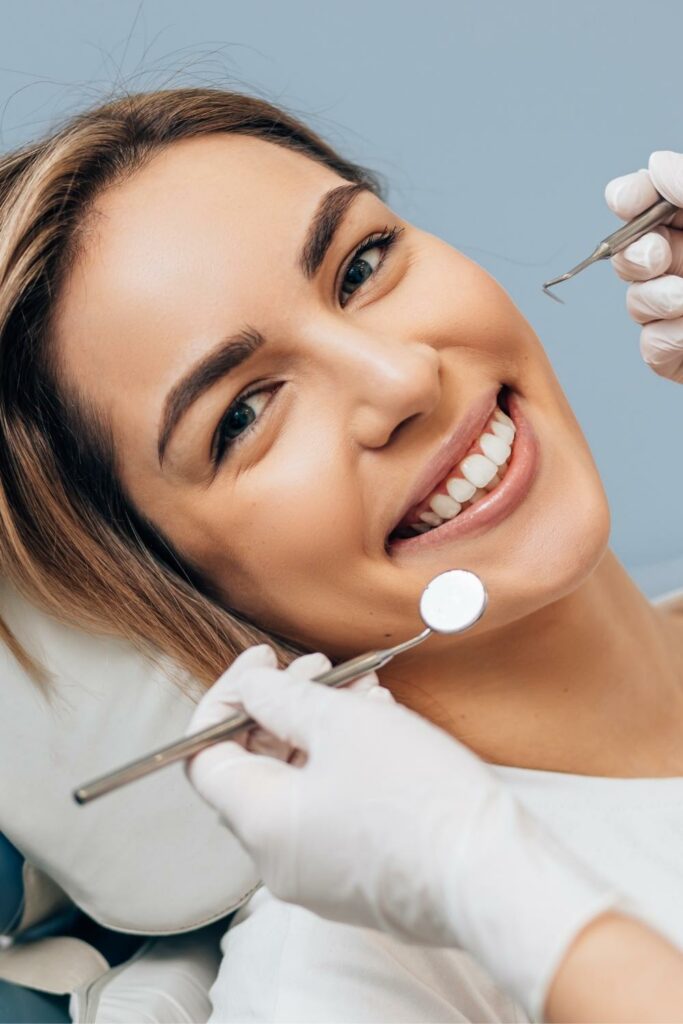Restorative dentistry
Restorative dentistry is also known as general dentistry and includes activities related to maintaining good oral hygiene.

Restorative dentistry - what is it?
Restorative dentistry is also referred to as general dentistry and includes activities related to maintaining good oral hygiene, preventing tooth decay and treating all types of cavities. It is worth remembering regular visits to the dental clinic and restorative dentistry, which helps to effectively prevent dental diseases. Patients who systematically undergo restorative dentistry strengthen their tooth structures and make them more resistant to bacteria, thus enjoying a healthy and beautiful smile.
Indications
- Carrying out a check-up of the mouth and teeth once every 6 months
- Removal of sensitivity problems and bleeding gums
- Cleaning the teeth of plaque and calculus
- Protection of children's teeth
- Toothache
- Tooth cavities
- Tooth decay
- Root canal treatment
- Treatment of post-traumatic conditions of teeth

Pain related
Complete painlessness of the procedures
Possible discomfort related to the injection of anaesthetic before the treatment
Duration
Depending on the scope of the treatment agreed with the patient, the appointment time is approximately 30 minutes to 1.5 hours
Repeatability
Follow-up visits for restorative dentistry are recommended once every 6 months
Recovery
No convalescence required

Results
- Beautiful and healthy smile
- Preservation of balance in the mouth
- Effective prevention of tooth disease
- Strengthening of tooth structure
- Making teeth more resistant to bacteria
- Complete healing of a tooth in which there was a cavity, without the need for extraction
"The aesthetics of teeth are extremely important and affect our daily sense of well-being. It is therefore worth remembering regular visits to the dentist's office and restorative dentistry, which will help to effectively prevent more serious oral infections and dental diseases."
Dr Wojciech Radwański, clinic owner
Methods
- Carrying out a check-up of the mouth and teeth - during such a visit, the doctor carefully checks the teeth for decay, makes a proper diagnosis and, if necessary, initiates the required treatment.
- Removal of problems related to hypersensitivity and bleeding gums;
- Plaque and tartar cleansing - the aim of the cleansing treatment is to effectively avoid the spread of caries by removing tartar, thus avoiding painful and complicated, and above all costly, treatment in the future.
- Caries treatment - treatment is applied according to the stage of caries. In the early stage, the treatment involves a precise cleaning of the teeth from plaque and calculus and the application of a varnish or fluoride gel to prevent further development of the disease. If caries has already penetrated the enamel after cleaning, the cavity is filled with a filling.
- Tooth capping for children - this is a way of treating cavities in deciduous teeth. It consists in soaking the baby teeth with lapis. This substance strengthens the teeth and has a bactericidal effect

Call and make an appointment!

Recommendations before
- Restorative dentistry treatment does not require any special preparation from the patient.
Recommendations after
- Directly after restorative dentistry procedures, it is advisable not to eator drink for about an hour..
FAQ - frequently asked questions about restorative dentistry
The frequency of dental check-ups is once every 6 months. In the case of children and teenagers, visits may be more frequent, especially if there are already carious lesions on the teeth. Therefore, it is a good idea to make sure that you are booked in for your next dental check-up and have this date written in your calendar.
The treatment of baby teeth is important for the health of children because it eliminates decaying bacteria which can spread with blood through the child's body and cause its weakness. In addition, healthy baby teeth contribute to the correct formation of the child's jaw and also enable the correct positioning of permanent teeth.
If caries is detected at an early stage, there is a good chance of completely healing the tooth without having to extract it. Thanks to restorative treatment, it is possible to avoid dental disease and inflammation in the oral cavity. Restorative dentistry allows you to keep your teeth healthy for many years.
Decay can lead to a number of gum and periodontal conditions, and is a common cause of bad breath. Untreated decay can also lead to heart, kidney and joint disease. If cavities in teeth are not treated properly, the internal structure of the tooth is damaged. The patient then begins to experience pain that worsens with eating, biting or temperature changes. If decay is not removed, it can lead to tooth decay and ultimately to the need for tooth extraction. Therefore, check-ups and regular contact with the dentist are important in order to prevent the development of caries or to detect and treat it at an early stage.
Tooth decay affects around 95% of adults nationwide. Tooth decay is often localised between the teeth because food residues are deposited there. Dental plaque, a combination of saliva, food debris and fluids that cause bacterial deposits, is responsible for the formation of caries. Caries is also influenced by genetic predisposition, certain diseases and poor nutrition, failure to observe good oral hygiene and a diet high in sugars.
The World Health Organisation recommends that tartar should be removed twice a year. Signals of excessive tartar accumulation may be inflammation of the gums, characterised by their redness, extreme sensitivity, swelling and bleeding, even when gently touched. The effect of supragingival scaling is to remove tartar from the dental crowns. The scaler head is applied to the tooth surface, then, thanks to vibrations at the right frequency and water at the right pressure, the tartar is broken down.